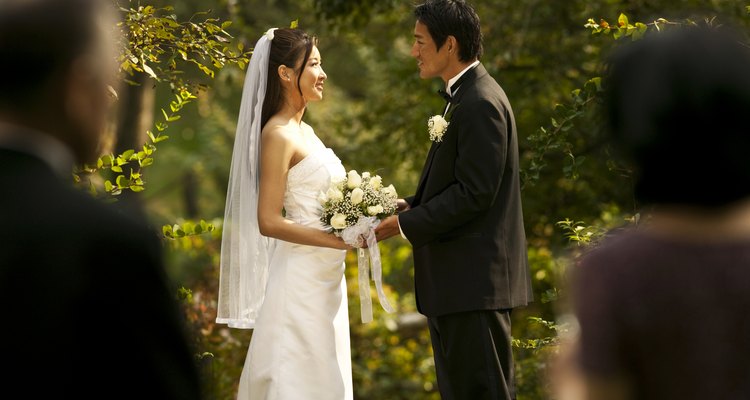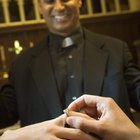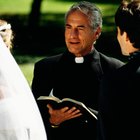
Wedding ceremonies can be as simple or elaborate as the marrying couple wishes. The vows, too, may be traditional or written by the couple for a more personal flair. Though much of the ceremony is flexible, the rules regarding the officiant are not. Only certain members of the community are able to perform marriage ceremonies in Colorado.
The Parties to Be Married
Colorado is the only state that allows the parties to be married (the bride and groom) to officiate their own ceremony. This procedure is done without any additional paperwork, as the two simply sign their names on the officiant's line. Not only does this save a bit of money, it also gives lends an intensely personal aspect to the wedding day. Couples then return the license to the county recorder, just as an officiant would do normally. Additionally, couples can choose to have an un-ordained master of ceremonies say their wedding but still sign the license themselves as the officiants.
Judges
In the state of Colorado, all judges may officiate marriage ceremonies. They are able to do so throughout the state, as their ability to do so is not tied to their county of residence or practice. Retired judges may also perform marriage ceremonies for as long after retirement as they wish.
Magistrates and Public Officials
Court magistrates are eligible to officiate weddings, as are retired members of this profession. Additionally, many public officials are also able to solemnize marriages, but those eligible to do so vary by state. Therefore, it is best to check with your county clerk for a list of those available to preside over marriages in your area.
Wedding Officiants
Those with the power to perform marriages due to their standing in a religious or Native American community are also legally allowed to perform marriages in Colorado. This includes members of the clergy from any religious denomination and leaders of tribes. The marriage ceremony must be conducted according to the traditions of that church or community for it to be considered valid, though any modes recognized by the community are acceptable.
Related Articles

Georgia Civil Ceremony Information

Can a Notary Marry Someone in Georgia?

Who Can Legally Perform Marriages in ...

Who Can Legally Perform a Wedding ...

How to Get Ordained to Officiate a ...

Who Can Perform Weddings in New Jersey?

Difference Between a Civil Wedding ...

Can a Notary Republic Marry People?

Laws for Performing Marriages in Florida

How to Obtain a Quaker Marriage License

Wedding Requirements & Checklist for a ...

Can You Have a Wedding Without ...

How Can I Get Certified to Marry People?

Documents Required for a Marriage ...

How to Prove a Common-Law Marriage in ...

Can an Ordained Minister Perform ...

How to Get a Marriage License While ...

How to Get Certified to Marry Couples

How to Become a Nonreligious Wedding ...

Marriage Requirements in International ...
References
Writer Bio
Andrea Hamilton has enjoyed being a writer since 1996. She has been published as a poet in "Fine Lines Magazine." Hamilton holds a Bachelor of Arts in literature from Iowa State University and is pursuing a Master of Arts in creative writing from London South Bank University.
Photo Credits
Comstock Images/Comstock/Getty Images